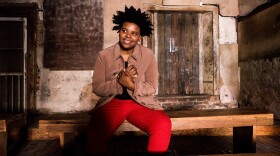Singer-songwriter Sarah Quintana grew up in the New Orleans music scene. She recalls her parents having friends like Deacon John Moore over for dinner. Those childhood experiences led her to pursue a career in music, with songs drawing from Louisiana folk traditions with influences from New Orleans. Over the past two decades, Quintana has released two full-length studio albums and toured across the country. Her new album, “Baby Don’t” is her attempt at making a Louisiana record “her way.” She said her album was inspired by old memories she has of falling asleep, listening to New Orleans rhythm & blues on the radio.
She spoke with host Karen Henderson about her new album.
This interview was edited for length and clarity.
SARAH QUINTANA: I remember those old, crunchy, crackly vinyl record sounds. Lots of songs in six-eight (time). Saxophone music and vocal harmonies and something about that era of music, fifties and sixties New Orleans music just kind of lulled me to sleep and made me feel really good.
KAREN HENDERSON: You've said that you set out to make a Louisiana record with this album. What made you want to do that?
QUINTANA: I really love being a part of my music community. I live in a Louisiana music bubble, and there's something so precise about music that you can tap your foot to that has something to do with the seasons or our way of life, how we celebrate our culture and community and also that has a little piece of something personal. That's your own specific twist on what it means to live here and make music here.
HENDERSON: A lot of the record, it feels like it could be played on the streets during festival season. Is that what you had in mind for a lot of this?
QUINTANA: Absolutely. I wanted to make a record that could stand on its own as a recording that would age well, that's classic. And I think these songs are successful because they come straight from the streets and they were tested at festival season and on Frenchman Streets for a few years. We even made certain elements of the arrangements based on a really good solo that happened one day or found ways to fit the songs into more of a dancey feel. I definitely take a moment on How Long to step out of that and sing a ballad on the record, but most of the songs on the record are for dancing.
HENDERSON: If you had to describe Louisiana music to someone who's not familiar with it, how would you describe it?
QUINTANA: I think I would talk about what it's not. It's not necessarily commercial in the way that other music projects and endeavors are. It's not necessarily clean or polished in the way that Nashville production is.
It doesn't always fit in squares. Sometimes there's extra measures or extra beats. It's funny in that way 'cause it's nuanced. It's more of an oral tradition. I'd say Louisiana music and culture has the right to exist just for its own self-pleasure and its own self preservation. Whereas in other places, you have to have a project with the title and it has to fit all of these different criteria to get funded or to have the ability to fit into that festival circuit and be seen on that programmers next year's project. I think that one of the things that Louisiana music is, is it's really free and it feels good in this way that it scratches an itch for me that other music, other places might not.
HENDERSON: The song Bump in the Road, it mentions Hurricane Katrina. Now this is the 20th anniversary of Hurricane Katrina. Did that factor in at all to the inclusion on this album?
QUINTANA: I did not know that or think of it. In general. I don't like to think about or talk about Katrina, but now that you mentioned it, there's a lot of things that are cyclical about making this record, and it is two decades of work. And after Katrina, when I lost everything, I had my guitar. And the way that I felt close to home was singing songs, singing standards, and I think I evacuated with a Louis Armstrong record on my phone, um, or on my, what was it at the time? MP3 player. And, a little bit of Jelly Roll Morton and I just love playing New Orleans music and listening to New Orleans music 'cause it makes me feel so at home. I think now more than ever, it is important to hold on to the good, to what brings us joy, and there is an ingredient in Louisiana music that is a feel good ingredient. It's designed to be uplifting to yourself and others. And I don't know if its any different now than it was during the pandemic or than my grandmother's era, but there is something about hope, um, that prevails in Louisiana music. And I do think that we could change the world.







